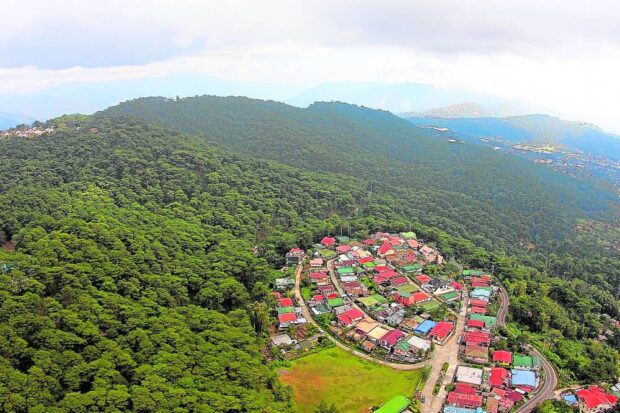Bill splits Baguio villages inside Camp John Hay

INDEPENDENCE The community of Scout Barrio, seen in this photo taken in 2009, is the first barangay within the Camp John Hay reservation to be segregated by the government in 2001.
Thirteen other Camp John Hay villages may also be excluded from the former American rest and recreation baseland through a bill now pending in Congress. —EV ESPIRITU
BAGUIO CITY—Congress is deliberating on a new measure that would exclude 13 barangays from Camp John Hay, which is under the custody of the Bases Conversion and Development Authority (BCDA).
House Bill No. 9428 releases these communities to the Baguio government, including its roads, open spaces and structures like schools and converts the settlements there as alienable and disposable to allow households to title their lands, said its sponsor, Baguio Rep. Marquez Go, in a recent interview.
Among these villages is Happy Hallow, which is also the only recognized Ibaloy ancestral domain in Baguio.
Also set for segregation are the villages of Upper Dagsian, Lower Dagsian, Military Cut-off, Hillside, Greenwater, Camp 7 (along Kennon Road), Lucnab, Sta. Escolastica Village, Country Club Village, Loakan Apugan, Loakan Liwanag and Loakan Proper. These communities had thrived while Camp John Hay was under American military control.
“But all forested zones would remain under the jurisdiction of BCDA,” Go said, noting that BCDA administers all former American baselands, including the 625-hectare Camp John Hay that served as an air station and a rest and recreation base for American soldiers.
Article continues after this advertisementThe lawmaker said he initiated the segregation bill following mounting pressure from residents because it was one of 19 conditions set by the city government that had not been fulfilled.
Article continues after this advertisementBCDA had promised to abide by these conditions in exchange for a 1994 city council endorsement of the master development plan that allowed the government to lease 288 ha of the Camp John Hay reservation.
Last year, nine councilors tried to convince then President Rodrigo Duterte to veto the bill that modernized Baguio’s 1909 Charter after learning that it separated Camp John Hay from the Baguio townsite reservation.
City’s interests
Critics believed the separation had compromised Baguio’s interests in Camp John Hay, including the 19 conditions.
The council has maintained this position after the new Baguio Charter (Republic Act No. 11689) lapsed into law on April 11, 2022, because of alleged errors in the document that may affect how the Baguio government operates.
According to Go, the segregation measure does not address issues plaguing Barangay Scout Barrio, a settlement built by former Camp John Hay employees, which was the first barangay to be segregated in 2001 through Executive Order (EO) No. 64, which was issued by then President Gloria Macapagal-Arroyo.
READ: Baguio asks Congress to undo John Hay’s segregation from city
But only households were separated from Camp John Hay and the community is now battling for rights to its own roads, open spaces like its sports field, barangay hall and school that continue to be “owned” by BCDA.
“The segregation of Scout Barrio is not yet complete,” according to a Scout Barrio letter that was read to the City Council during its Nov. 13 session. It added: “About 15.9 ha of the barangay has been declared as a socialized housing site [which led to the titling of houses] but only 8.1 ha has been declared for disposition per the internal rules and regulations of EO 64.”